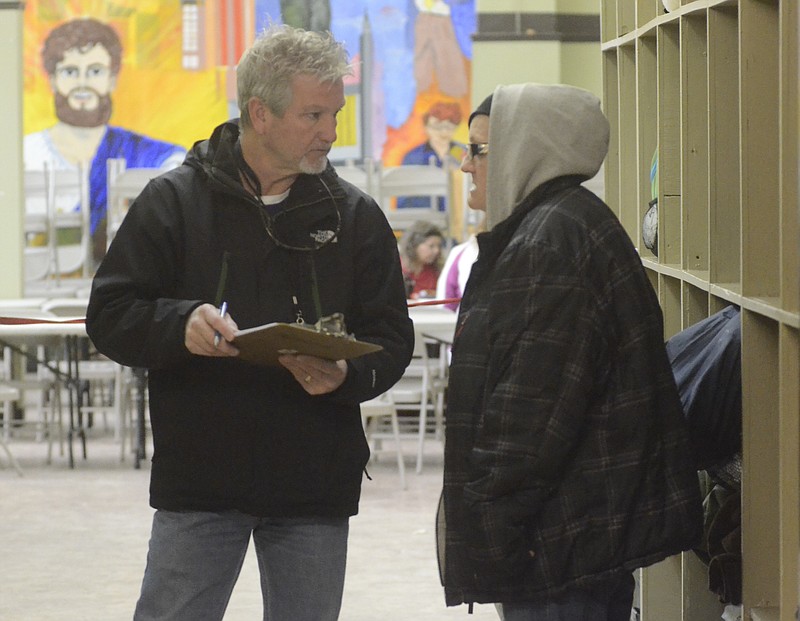Faith-based care around the nation
Participating cities and the percentage of emergency shelter beds provided by faith-based organizations› Portland, Ore. (443 total beds) — 33 percent of 443 total beds› San Diego, Calif. (562 total beds) — 37 percent› Phoenix, Ariz. (974 total beds) — 41 percent› Atlanta, Ga. (449 total beds) — 49 percent› Jacksonville, Fla. (510 total beds) — 52 percent› Denver, Colo. (1,858 total beds) — 56 percent› Seattle, Wash. (2,325 total beds) — 63 percent› Baltimore, Md. (1,003 total beds) — 74 percent› Indianapolis, Ind. (924 total beds) — 77 percent› Houston, Texas (1,047 total beds) — 79 percent› Omaha, Neb. (923 total beds) — 90 percent
Report
To read the full report, go to: www.baylorisr.org/wp-content/uploads/ISR-Homeless-FINAL-01092017-web.pdf
In Atlanta, the number is 49 percent. In Indianapolis, it's 77. In Seattle, it's 63.
The figures reflect the percentage of shelter beds provided by faith-based organizations in those cities, according to a study released last week.
And while faith-based groups in Chattanooga are the drivers when it comes to providing shelters for the city's homeless, local homeless advocates say that lofty perch isn't quite so high because the overall number of beds in Chattanooga is tiny, faith-based or not.
The advocates can only come up with a handful of places in town that are ongoing homeless shelters - Chattanooga Rescue Mission, Union Gospel Mission, Maclellan Shelter for Families. The Rescue Mission can house 60; the Maclellan shelter, located in the Chattanooga Community Kitchen on East 11th Street, has 13 rooms and 64 beds for families; the Union mission can fit about 20, but it's a transitional shelter in which the homeless stay for multiple nights and try to get their lives back together.
There also are churches in the area that will house homeless families when the need arises.
The number of beds citywide goes up when the weather gets numbingly cold and such spots at the Salvation Army and Community Kitchen offer beds for a night or two. But overall, the emergency bed situation is "pretty sad," says Stephen Wright, executive director of the Chattanooga Regional Homeless Coalition.
Funded by Chattanooga's Maclellan Family Foundation and M.J. Murdock Charitable Trust in Vancouver, Wash., the new study, which looked at 11 cities across the country, used data from the U.S. Department of Housing and Urban Development to determine the percentage of shelter beds provided by homeless ministries and similar groups. It was conducted by the Baylor Institute for Studies of Religion, part of the Texas university.
"The central purpose of this study is to assess the role that [faith-based organizations] play in meeting the needs of homeless men, women and families," the report says. But it also was intended "to provide an initial, credible estimate of the impact, socially and economically, of faith-based organizations."
The study defined faith-based organizations as groups in which "a particular faith (e.g., Christian, Jewish, etc.) serves as the primary motivation to serve individuals and families experiencing homelessness. This definition includes organizations that require participation in religious activities (e.g., Bible studies, worship, etc.), organizations that provide religious activities on a voluntary basis and those organizations that do not provide any type of explicitly religious activities but whose employees are primarily motivated by their faith to serve others."
In a news statement, David Denmark, executive director of the Maclellan Family Foundation said: "This new study brings light to the important - and now measurable - contributions faith-based organizations make to our country's common good."
Titled "Assessing the Faith-Based Response to Homelessness in America: Findings From Eleven Cities," the report interviewed officials with such organizations as The Salvation Army, Catholic Charities, Family Promise and Jewish Family/Community Services. It found that faith-based organizations in the 11 cities accounted for no less than one-third of all such beds and, in some cases, more than three-quarters. Portland was the lowest at 33 percent, Omaha the highest at 90.
"That's a pretty wide gap," Wright says.
But the fact that faith-based groups are taking up the slack left through lack of money or lack of concern by the federal government "doesn't surprise me," he says.
"HUD doesn't fund shelters like they used to. Most are privately funded or through local governments."
Even when it comes to local governments, providing beds for the homeless "is not high on the priority list at this time," he adds.
Mayor Andy Berke has said he wants to allocate money toward helping homeless veterans. In the city's 2017 budget, there is a total of $135,000 for the categories of "Veterans Homeless to Housed," "Transitional Housing" and "Homeless to Housed Fellows Program" with $85,000 going to "Veterans Homeless" and $50,000 each for the other two. The budget also gives $70,000 to "Cold Weather Shelter."
One of the study's conclusions is that, over a three-year period, faith-based groups saved an estimated $119 million in tax dollars for the 11 cities surveyed. The study adds that the number is based on "preliminary analysis" and "is not intended in any way to represent or suggest that faith-based programs are more cost-effective" when compared to HUD's Housing First, the department's primary program to address homelessness.
Mary Ellen Galloway, executive director of Family Promise of Greater Chattanooga, says faith-based groups sometimes clash with government regulations, so some organizations "choose to not engage" government entities.
Her organization partners with 40 to 50 local churches and synagogues, many opening their buildings to help provide overnight shelters for families. Other faith-based volunteers help out by providing such things as meals, transportation, even just company for the families, she says.
"They come and play with the children or tutor the children, or they may just come and hang out with the families and provide friendship and fellowship," Galloway says.
Homeless shelters are a rarity in Chattanooga "because they don't have the support from the community," says Kimberly George, director of marketing and development for the local Salvation Army.
But taking care of the homeless is a tenet of Christianity, she says.
"The Bible tells us the poor will always be among you," she says. "The church knows that we as Christians, especially Christian churches, understand that it's part of our charge from Christ to take care of those in need."
Jon Rector, executive director of the Union Gospel Mission, one of the few faith-based organizations in Chattanooga that offers shelter to the homeless, isn't surprised by the lack of federal funding, but he doesn't necessarily think that's a bad thing.
"My take on it is that it's the church's responsibility [to help the homeless], and we only have more problems when we turn over our responsibilities to the government," he says.
The Union Gospel Mission has been in operation since 1950 and once could house more than 100 homeless people a night, Rector says. Originally affiliated with Highland Park Baptist Church, the mission has been on its own since 2008 and, in its current building, can host about 20 homeless, he says. But, as provider of transitional housing, the mission's goal is different than other shelters, he notes.
The Baylor study also looked at groups offering transitional housing, officially known as Residential Recovery and Job Readiness programs. Using a self-reported survey from the faith-based organizations, the study says the groups save taxpayer money by reducing the financial expenses of law enforcement, public assistance and health care.
The Salvation Army's George says it had proposed building a homeless shelter that it would run and maintain, but "we didn't receive the funding," either from local governments, community-based groups or the public. Estimates said it would have cost from $2.5 million to $3 million to build and that annual operational expenses would run between $300,000 and $500,000, depending on whether it was an overnight shelter or transitional.
Galloway says homeless shelters are critical to ending an individual's homelessness.
"Securing gainful employment and independent housing are unlikely living in a car or on the street," she says.
Contact Shawn Ryan at sryan@timesfreepress.com or 423-757-6327.

